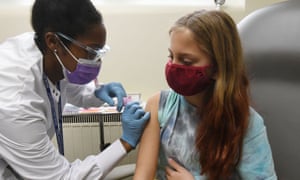
11.09am EST11:09
UK Covid infections continue to rise with 47,240 new cases recorded and 147 new deaths
10.45am EST10:45
Merkel warns ‘every day counts’ in dealing with pandemic and implores successor to bring in more restrictions
Updated
at 10.47am EST
10.36am EST10:36
The Netherlands prepares to introduce a swathe of ‘heavy measures’ to slow Covid spread amid surge
Updated
at 10.50am EST
9.16am EST09:16
New UK data finds Covid vaccination is safe for pregnant women
Updated
at 9.24am EST
8.59am EST08:59
Slovakia goes into two-week lockdown – closing non-essential shops, restricting movement and gatherings
Updated
at 9.21am EST
8.00am EST08:00
Travellers within EU should get Covid booster to avoid testing and quarantine, says executive
The European Union executive has proposed that travellers should get a booster jab nine months after their original vaccines, if they want to maintain ease of movement inside the bloc.
The European Commission said there should be a standard nine-month acceptance period for vaccines across the bloc, in a bid to avoid a confusing hodgepodge of rules across the 27 member states. Travellers moving within the EU should get a booster jab after nine months in order to avoid testing and quarantine.
The Commission is expected to propose similar measures for travellers coming into the EU later on Wednesday. The nine-month period reflects scientific advice that the first round of vaccines wanes after six months, adding three months to allow governments to get booster-shot programmes up and running.
Both draft laws would have to be approved by EU member states before entry into force, which is expected in 2022.
Didier Reynders, the EU commissioner for justice, described the policy as a move to a person-based approach, rather than classifying travellers purely by their country of departure.
Our main objective is to avoid diverging measures throughout the EU. This also applies to the question of boosters, which will be essential to fight the virus. Among other measures, we propose today that the council [of EU ministers] agrees on a standard validity period for vaccination certificates issued following the primary series. Agreeing on this proposal will be crucial for the months ahead and the protection of the safe free movement for citizens.
Under the plans, cross-border commuters, lorry drivers and children under 12 would continue to be exempt from travel rules, although the list of exempt groups has been reduced.
Ursula von der Leyen, the president of the European Commission, urged European citizens to get vaccinated, after EU health agencies recommended booster jabs earlier this week as part of a strategy to stem a surge in infections.
Von der Leyen, a trained medical doctor, said:
A quarter of EU adults are still not fully vaccinated. If you are unvaccinated, you are more at risk of having severe COVID-19 symptoms. Vaccination protects you, and the others.
Updated
at 8.11am EST
7.35am EST07:35
EU regulator approves Pfizer vaccine for children aged five to 11
Updated
at 7.48am EST









